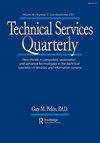NCIMeta叙词表
IF 0.5
Q3 INFORMATION SCIENCE & LIBRARY SCIENCE
引用次数: 0
摘要
不再支持地理细分,因为通过发现层进行分面是链接数据未来的假定部分。所有这些变化自然会保证大型编目实用程序(如OCLC)和小型本地图书馆系统都需要大量的数据库维护。这些变化于2023年3月6日在RBMS CVRMC的官方发布电子邮件中宣布,该电子邮件由RBMS受控词汇编辑小组的联合主席发送给了几个列表服务。编辑小组清楚地意识到这些变化将对在线图书馆目录中的发现产生影响,并在电子邮件中表示,“我们正在创建一个用于书目文件维护的人行横道电子表格,一旦可用,我们将发布公告。“尽管如此,大部分清理工作仍将由各个图书馆完成(或支付费用),这可能会给规模较小或资金不足的图书馆带来负担。主搜索页面上有一个非常重要(也很容易被忽视)的链接,指向序言材料RBMS CVRMC简介(https://docs.google.com/document/d/1kpKLgtHLXy1nlkC-cuLAjzcbuDW5qy_czlyT0kXsQtk/edit)。以下是应用说明、指导原则、历史实践和偏见声明。本文件非常重要,特别是在术语应用的变化方面,其链接应在国会图书馆RBMS CVRMC的搜索页面上更加突出。不管隐藏的介绍链接如何,RBMS控制的词汇的搜索网站与以前的搜索网站相比是一个巨大的改进,并且考虑到当代的发现层和链接数据环境的可预见的未来,RBMS受控词汇的应用变化是合理的。评分:5分(满分5分)本文章由计算机程序翻译,如有差异,请以英文原文为准。
The NCIMetathesaurus (NCIm)
geographical subdivision is no longer supported since the use of faceting through discovery layers is an assumed part of a linked data future. All these changes will naturally warrant a large amount of database maintenance for both the larger cataloging utilities such as OCLC and the smaller local library systems. These changes were announced on March 6, 2023, in an official RBMS CVRMC launch e-mail sent out to several listservs by the co-chairs of the RBMS Controlled Vocabularies Editorial Group. The editorial group clearly are aware of the impact the changes will have on discovery in online library catalogs and in that e-mail stated, “We are in the process of creating a crosswalk spreadsheet for use in bibliographic file maintenance, and we will make an announcement once it is available.” Still the bulk of the clean-up will have to be done (or paid for) by individual libraries and may be burdensome to smaller or less well funded libraries. Not to be disregarded on the main search page is a very important (and easily overlooked) link to the prefatory material, RBMS CVRMC Introduction (https:// docs.google.com/document/d/1kpKLgtHLXy1nlkC-cuLAjzcbuDW5qy_czlyT0kXsQtk /edit). Here are given the application instructions, guiding principles, historical practices, and a bias statement. There is so much of importance in this document, particularly in terms of the changes in the application of the terms, that its link should be made more prominent on the Library of Congress search page for RBMS CVRMC. Regardless of the hidden introduction link, the search site for the RBMS Controlled Vocabularies combined as such is a huge improvement over the previous search site and the changes in the application of the RBMS Controlled Vocabularies terms are reasonable considering contemporary discovery layers and the foreseeable future of a linked data environment. Rating: 5 out of 5
求助全文
通过发布文献求助,成功后即可免费获取论文全文。
去求助
来源期刊

Technical Services Quarterly
INFORMATION SCIENCE & LIBRARY SCIENCE-
CiteScore
0.80
自引率
0.00%
发文量
70
期刊介绍:
Technical Services Quarterly is dedicated to providing a forum for the presentation of current developments and future trends concerning the technical operations of libraries and information centers. The journal aims to keep its readers informed of current developments and future trends in research, developments, and practical implementation of systems and applications of traditional and non-traditional technical services and the public operations they influence and sustain. The journal accepts original research, theoretical, and implementation articles pertaining to technical services, automation, networking, document delivery, information technology, library instruction and information literacy, reference and bibliography, case studies, cost analysis, staffing, etc.
 求助内容:
求助内容: 应助结果提醒方式:
应助结果提醒方式:


